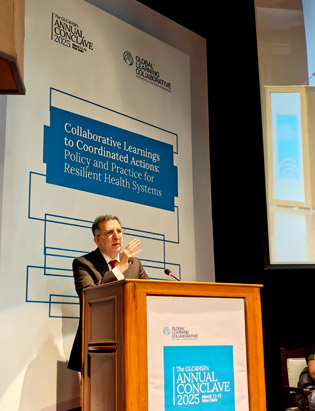 |
| Siddharth Sharma, CEO of Tata Trusts, addresses the Global Learning Collaborative for Health Systems Resilience (GLC4HSR) Annual Conclave 2025 in New Delhi. |
Siddharth Sharma, CEO of Tata Trusts, emphasised the critical need for healthcare resilience in the face of pandemics, climate change, and economic disparities in his address at the Global Learning Collaborative for Health Systems Resilience (GLC4HSR) Annual Conclave 2025 in New Delhi.
Speaking to a gathering of global health leaders at the Indian National Science Academy, Mr Sharma stressed the necessity of building adaptive, robust, and equitable healthcare systems to safeguard vulnerable, growing populations and their evolving needs.
“Healthcare resilience is much more than a strategy – it is an imperative, ensuring that no individual is left vulnerable, regardless of their socioeconomic status, health conditions, or geography,” Mr Sharma stated.
Mr Sharma further elaborated on the challenges that test resilience, including sudden crises like pandemics, climate change and disasters, and other stress factors such as geographic inaccessibility, workforce shortages, inadequate infrastructure, fragmented supply chains, and financial constraints.
“These issues of low capability, access and affordability make resilience-building an urgent necessity to address the challenges that face us,” Mr Sharma added.
A Bottom-Up Approach: Strengthening Primary Healthcare
A key focus of Mr Sharma’s address was the importance of strengthening primary healthcare systems, as they are a citizen’s first point of entry into the care system, and a significant number of healthcare concerns can be addressed at this stage.
“In a country like India, where we have 1.4 billion people and growing, we can keep creating as many tertiary institutions as we want. The scale is such that it is really not going to have an impact, and therefore, unless there are investments in primary and secondary healthcare, we are not going to get anywhere.
“The system has to be built bottom-up, not top-down. If the foundation is not strong, there is no way the building will withstand the stressors,” he remarked, urging for greater investment in primary and secondary healthcare systems to reduce the burden on tertiary care facilities.
Mr Sharma highlighted the Tata Trusts’ commitment to ensuring care for all, with a focus on underserved communities, and how it has been at the forefront of innovative healthcare solutions, leveraging telemedicine and digital health interventions to bridge gaps in healthcare access. He detailed the Trusts’ hub-and-spoke telemedicine model, successfully implemented in Uttar Pradesh, Andhra Pradesh, and Telangana, providing over several hundred thousand specialist consultations to patients in rural India.
Citing an example of Telangana, Mr Sharma explained how the Trusts’ extensive experience with healthcare innovations enabled the team, in partnership with the local Government, to swiftly convert a central, non-hospital hub, allowing over 2,000 patients to receive treatment at home and easing the strain on overcrowded government hospitals.
“The necessity of digital consultations has been well-established, and the government’s issuance of telemedicine guidelines and adoption of e-Sanjeevani are welcome moves,” he said, advocating for the scaling up of digital healthcare solutions.
Distributed Cancer Care Model
The Distributed Cancer Care Model, aimed at early detection and treatment accessibility, has been one of the Tata Trusts’ most impactful initiatives. Mr Sharma spoke about the Assam Cancer Care programme, in partnership with the Government of Assam, where 17 cancer hospitals are being set up across the state, ensuring that every resident is within 150 km of a high-quality cancer care facility.
“There’s an Apex Centre, which is the State Cancer Institute of Guwahati, and then there are decentralised centres across the state, and this has worked extremely well. This has been recommended by the Parliamentary Standing Committee on Health to be replicated across India. Several state governments, including Uttar Pradesh and Maharashtra, are exploring its implementation,” said Mr Sharma before stating that diagnosing cancer at Stage 1 leads to higher survival rates.
Reinforcing the urgent need for healthcare resilience, Mr Sharma concluded his address by stating: “The gains made by countries across the world in building resilient systems in response to the COVID-19 pandemic can be quickly lost if we are not vigilant.”
GLC4HSR Annual Conclave 2025
The GLC4HSR Annual Conclave 2025 was themed ‘Collaborative Learnings to Coordinated Actions: Policy and Practice for Resilient Health Systems’. Since its inception in 2022, the GLC4HSR has championed knowledge-sharing and innovation to strengthen health systems resilience.
The GLC4HSR Annual Conclave 2025 brought together leading experts, policymakers, and healthcare professionals to explore strategies for building stronger, more resilient health systems capable of withstanding future crises. The two-day conclave included panel discussions, case study presentations, and policy round-tables.
The event was graced by dignitaries including Dr Yupadee Sirisinsuk, Deputy Secretary-General of Thailand’s National Health Security Office, who participated virtually and Dr Ahmed El-Sobky, Chairman of the Egypt Healthcare Authority. The conclave also saw the participation of Dr Jayaprakash Narayana, Founder of the Foundation for Democratic Reforms, Prof Mala Rao, Director of the Ethnicity and Health Unit at Imperial College London, and Dr N Krishna Reddy, CEO of ACCESS Health International, among others.
